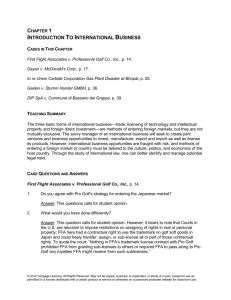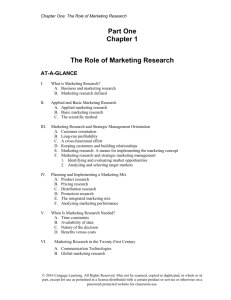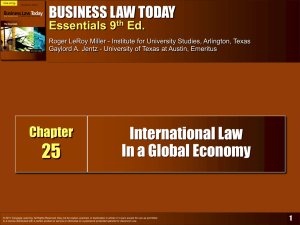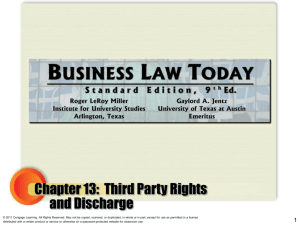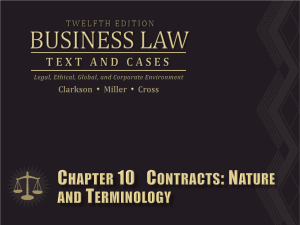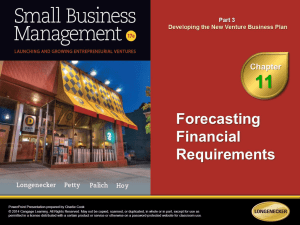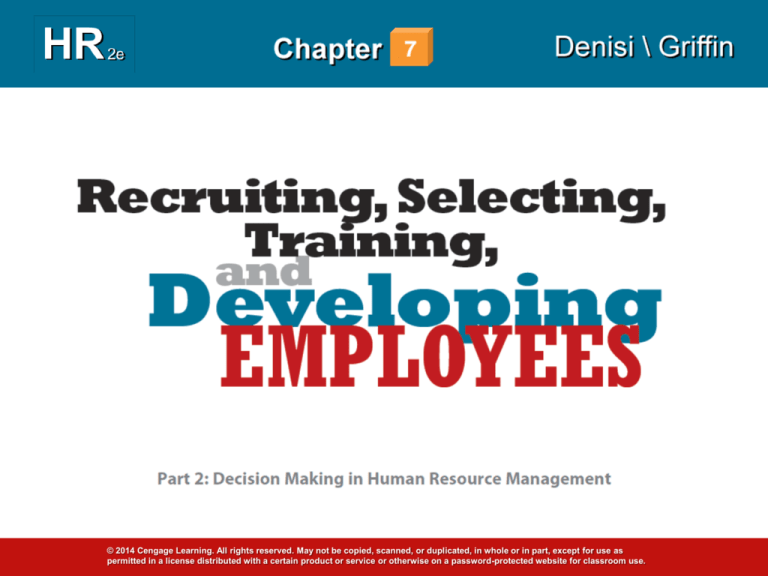
© 2014 Cengage Learning. All rights reserved. May not be copied, scanned, or duplicated, in whole or in part, except for use as
permitted in a license distributed with a certain product or service or otherwise on a password-protected website for classroom use.
Learning Objectives
After studying this chapter, you should be able to:
1. Describe the recruiting process, including internal and
external recruiting and the importance of realistic job
previews
2. Discuss the steps in the selection process and identify
and the basic selection criteria used by organizations
3. Identify and discuss popular selection techniques that
organizations use to hire new employees
4. Describe the selection decision, including potential
selection errors and reliability and validity.
5. Discuss how organizations train and develop new
employees to better enable them to perform effectively
© 2014 Cengage Learning. All rights reserved. May not be copied, scanned, or duplicated, in whole or in part, except for use as
permitted in a license distributed with a certain product or service or otherwise on a password-protected website for classroom use.
7–2
Recruiting
The process of developing a pool of
qualified applicants who are interested in
working for the organization and from
which the organization might reasonably
select the best individual or individuals to
hire for employment.
© 2014 Cengage Learning. All rights reserved. May not be copied, scanned, or duplicated, in whole or in part, except for use as
permitted in a license distributed with a certain product or service or otherwise on a password-protected website for classroom use.
7–3
Organizational and Individual Goals in Recruiting
© 2014 Cengage Learning. All rights reserved. May not be copied, scanned, or duplicated, in whole or in part, except for use as
permitted in a license distributed with a certain product or service or otherwise on a password-protected website for classroom use.
7–4
Sources for Recruiting
• Internal Recruiting
Looking inside the organization
Job posting
Supervisory recommendations
• External recruiting
Looking to sources outside
the organization
for prospective
employees
© 2014 Cengage Learning. All rights reserved. May not be copied, scanned, or duplicated, in whole or in part, except for use as
permitted in a license distributed with a certain product or service or otherwise on a password-protected website for classroom use.
7–5
Advantages and Disadvantages
of Internal and External Recruiting
© 2014 Cengage Learning. All rights reserved. May not be copied, scanned, or duplicated, in whole or in part, except for use as
permitted in a license distributed with a certain product or service or otherwise on a password-protected website for classroom use.
7–6
External Recruiting Methods
Word-of-mouth
Advertisements
College placement
offices
Employment
agencies
Electronic
recruiting
© 2014 Cengage Learning. All rights reserved. May not be copied, scanned, or duplicated, in whole or in part, except for use as
permitted in a license distributed with a certain product or service or otherwise on a password-protected website for classroom use.
7–7
Electronic Recruiting
• Advantages:
Cost effective
Time saver
Reaches a large
number of
applicants
© 2014 Cengage Learning. All rights reserved. May not be copied, scanned, or duplicated, in whole or in part, except for use as
permitted in a license distributed with a certain product or service or otherwise on a password-protected website for classroom use.
7–8
Employment Agencies
• Public employment agencies
• Private employment agencies
• Executive search firms
© 2014 Cengage Learning. All rights reserved. May not be copied, scanned, or duplicated, in whole or in part, except for use as
permitted in a license distributed with a certain product or service or otherwise on a password-protected website for classroom use.
7–9
Internships: A Mixed Model
• A form of temporary employment
• Intern must be a good fit
• Hiring an intern is a form of internal
and external recruiting
© 2014 Cengage Learning. All rights reserved. May not be copied, scanned, or duplicated, in whole or in part, except for use as
permitted in a license distributed with a certain product or service or otherwise on a password-protected website for classroom use.
7–10
Realistic Job
Preview Benefits
• Helps ensure that job seekers understand
the actual nature of jobs available to them.
• Provides job applicants with an opportunity
to observe others performing the work.
© 2014 Cengage Learning. All rights reserved. May not be copied, scanned, or duplicated, in whole or in part, except for use as
permitted in a license distributed with a certain product or service or otherwise on a password-protected website for classroom use.
7–11
The Selection Process
• Selection Process
Is concerned with identifying the best
candidate or candidates for jobs from among
the pool of qualified applicants developed
during the recruiting process.
• Basic Selection Criteria
Education
Experience
Skills and abilities
© 2014 Cengage Learning. All rights reserved. May not be copied, scanned, or duplicated, in whole or in part, except for use as
permitted in a license distributed with a certain product or service or otherwise on a password-protected website for classroom use.
7–12
Steps in the Selection Process
The recruiting
process
Gather information about
pool of qualified applicants
Evaluate the qualifications
of each applicant
Make decisions about
employment offers
© 2014 Cengage Learning. All rights reserved. May not be copied, scanned, or duplicated, in whole or in part, except for use as
permitted in a license distributed with a certain product or service or otherwise on a password-protected website for classroom use.
7–13
Big Five Personality Traits
Neuroticism
Extraversion
Agreeableness
Openness to
experience
Conscientiousness
© 2014 Cengage Learning. All rights reserved. May not be copied, scanned, or duplicated, in whole or in part, except for use as
permitted in a license distributed with a certain product or service or otherwise on a password-protected website for classroom use.
7–14
A Sample
Selection
System
© 2014 Cengage Learning. All rights reserved. May not be copied, scanned, or duplicated, in whole or in part, except for use as
permitted in a license distributed with a certain product or service or otherwise on a password-protected website for classroom use.
7–15
Employment Applications
Types of employment
applications
Weighted
application
Biodata
application
© 2014 Cengage Learning. All rights reserved. May not be copied, scanned, or duplicated, in whole or in part, except for use as
permitted in a license distributed with a certain product or service or otherwise on a password-protected website for classroom use.
7–16
A Sample
Employment
Application
© 2014 Cengage Learning. All rights reserved. May not be copied, scanned, or duplicated, in whole or in part, except for use as
permitted in a license distributed with a certain product or service or otherwise on a password-protected website for classroom use.
7–17
A Sample
Employment
Application
(cont’d)
© 2014 Cengage Learning. All rights reserved. May not be copied, scanned, or duplicated, in whole or in part, except for use as
permitted in a license distributed with a certain product or service or otherwise on a password-protected website for classroom use.
7–18
Testing Applicants
• Employment Tests
Measure the characteristics of an individual,
such as personality, intelligence, or aptitude.
Cognitive ability tests
Psychomotor ability tests
• Personality Tests
Measure traits, or tendencies to act, that are
relatively unchanging in a person.
Self-report inventory
Projective technique
© 2014 Cengage Learning. All rights reserved. May not be copied, scanned, or duplicated, in whole or in part, except for use as
permitted in a license distributed with a certain product or service or otherwise on a password-protected website for classroom use.
7–19
Sample Items from an Employment Test
© 2014 Cengage Learning. All rights reserved. May not be copied, scanned, or duplicated, in whole or in part, except for use as
permitted in a license distributed with a certain product or service or otherwise on a password-protected website for classroom use.
7–20
Employment Tests (cont’d)
• Integrity Tests
Attempt to assess an applicant’s moral
character and honesty.
• Work Simulations (or Work Samples)
Ask the prospective employee to perform
tasks or job-related activities that simulate
or represent the actual work for which the
person is being considered.
© 2014 Cengage Learning. All rights reserved. May not be copied, scanned, or duplicated, in whole or in part, except for use as
permitted in a license distributed with a certain product or service or otherwise on a password-protected website for classroom use.
7–21
Employment Tests (cont’d)
• In-Basket Exercises
A type of work simulation for prospective
managers; consist of collections of
hypothetical:
Memos
Letters
Notes that
require responses
© 2014 Cengage Learning. All rights reserved. May not be copied, scanned, or duplicated, in whole or in part, except for use as
permitted in a license distributed with a certain product or service or otherwise on a password-protected website for classroom use.
7–22
Personal Interviews
A selection technique that uses a faceto-face conversation between the job
applicant and a representative of the
organization as part of the selection
process.
© 2014 Cengage Learning. All rights reserved. May not be copied, scanned, or duplicated, in whole or in part, except for use as
permitted in a license distributed with a certain product or service or otherwise on a password-protected website for classroom use.
7–23
Personal Interviews (cont’d)
Types of Interviews
Structured
employment
interview
Semistructured
employment
interview
Unstructured
employment
interview
© 2014 Cengage Learning. All rights reserved. May not be copied, scanned, or duplicated, in whole or in part, except for use as
permitted in a license distributed with a certain product or service or otherwise on a password-protected website for classroom use.
Situational
interview
7–24
Personal Interviews (cont’d)
Types of Interview Errors
First
impression
errors
Contrast
errors
Similarity
errors
Non-relevancy
errors
© 2014 Cengage Learning. All rights reserved. May not be copied, scanned, or duplicated, in whole or in part, except for use as
permitted in a license distributed with a certain product or service or otherwise on a password-protected website for classroom use.
7–25
Selection Errors
• False Positives
Applicants who are predicted to be successful
and are hired but ultimately fail.
• False Negatives
Applicants who are predicted to fail and are
not hired, but had they been hired, they
would have been successful.
© 2014 Cengage Learning. All rights reserved. May not be copied, scanned, or duplicated, in whole or in part, except for use as
permitted in a license distributed with a certain product or service or otherwise on a password-protected website for classroom use.
7–26
Selection Errors
© 2014 Cengage Learning. All rights reserved. May not be copied, scanned, or duplicated, in whole or in part, except for use as
permitted in a license distributed with a certain product or service or otherwise on a password-protected website for classroom use.
7–27
Reliability and Validity
• Reliability
The consistency of a particular selection
device; not the same as accuracy
• Validity
Whether or not an assessment tool
measures what it is supposed to
Must be determined empirically to defend
against charges of hiring discrimination
© 2014 Cengage Learning. All rights reserved. May not be copied, scanned, or duplicated, in whole or in part, except for use as
permitted in a license distributed with a certain product or service or otherwise on a password-protected website for classroom use.
7–28
Validity
Forms of Test Validity
Criterionrelated
validity
Content
Validity
Construct
validity
© 2014 Cengage Learning. All rights reserved. May not be copied, scanned, or duplicated, in whole or in part, except for use as
permitted in a license distributed with a certain product or service or otherwise on a password-protected website for classroom use.
7–29
Scatter Plots for Five Correlation Coefficients
These diagrams illustrate correlations of 1.00 (a), –1.00 (b), zero (c), .80 (d), and .10 (e).
© 2014 Cengage Learning. All rights reserved. May not be copied, scanned, or duplicated, in whole or in part, except for use as
permitted in a license distributed with a certain product or service or otherwise on a password-protected website for classroom use.
7–30
Legal and Effectiveness Issues
in Recruiting and Selection
• HR’s Crucial Role in Selection
HR managers help the organization defend
itself in hiring discrimination cases.
• Utility Analysis
Attempts to determine how much benefit a
selection system provides to an organization.
Assesses the practical payoff for any
selection system.
© 2014 Cengage Learning. All rights reserved. May not be copied, scanned, or duplicated, in whole or in part, except for use as
permitted in a license distributed with a certain product or service or otherwise on a password-protected website for classroom use.
7–31
Training and Development
• Training
A planned attempt by an organization to
facilitate employee learning of job-related
knowledge, skills, and behaviors.
• Development
Teaching managers and professionals the
skills needed for both present and future jobs
© 2014 Cengage Learning. All rights reserved. May not be copied, scanned, or duplicated, in whole or in part, except for use as
permitted in a license distributed with a certain product or service or otherwise on a password-protected website for classroom use.
7–32
Assessing Training and Development Needs
Needs
analysis
• Organization’s jobrelated needs
• Capabilities of the
existing workforce
Setting
organizational
and individual
training and
development
goals
Determining
approach
• In-house programs
• Outsourced
programs
© 2014 Cengage Learning. All rights reserved. May not be copied, scanned, or duplicated, in whole or in part, except for use as
permitted in a license distributed with a certain product or service or otherwise on a password-protected website for classroom use.
7–33
Organizational Development
• Organizational Development
A system-wide effort, managed from
the top of the organization, to increase
the organization’s overall performance
through planned interventions.
• OD Techniques
Survey feedback
Third-party peacemaking
Process consultation
© 2014 Cengage Learning. All rights reserved. May not be copied, scanned, or duplicated, in whole or in part, except for use as
permitted in a license distributed with a certain product or service or otherwise on a password-protected website for classroom use.
7–34



